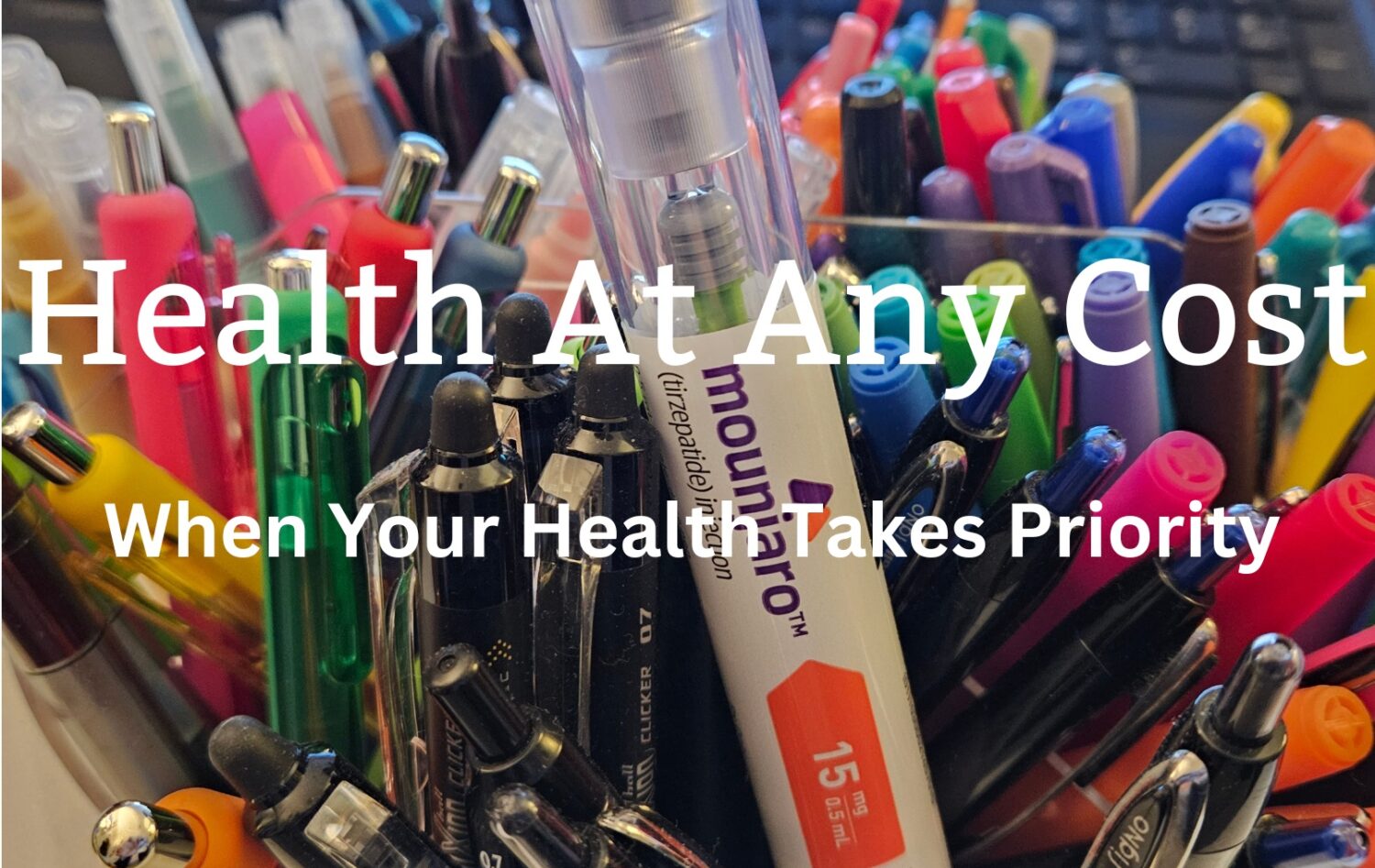Many times, I have said I’ve eaten enough over the last 62 years. Not having food noise imploring me to eat more or my not eating out of habit is freeing.
Though there was a time I used to say, “If I died tomorrow, will I be glad I had a carrot stick for lunch or will I feel sad I didn’t have that brownie?” Of course the brownie won out and I made sure to always eat at least two. Or the pan. Just in case I died. The prospect that the whole batch of brownies might be what killed me wasn’t even in the equation. Now I know it was the equation!

Holiday Season 2023:
Time for an Ozempic Vacation?
In Can You Skip an Ozempic Dose to Eat More at Thanksgiving? experts discuss the loophole of foregoing your meds to enjoy more food. I’ve seen this all over the Internet, the number of people taking an Ozempic Vacation. Their reasoning is to be able to enjoy and indulge in food and alcohol.
Yes, GLP-1s can cause folks to not want to drink alcohol. Alcohol aversion is being studied and Science Direct shares some findings:
- GLP-1 receptor activation reduces several alcohol consumption-related behaviours.
- The alcohol-GLP-1 link involve reward related areas and an area of the hindbrain.
“With the drug’s surge in popularity, doctors and patients have begun to notice a striking side effect of these drugs: They appear to reduce people’s cravings for alcohol, nicotine and opioids. They may also reduce some types of compulsive behaviors, such as gambling and online shopping.”
“There’s really been a large number of clinical and anecdotal reports coming in suggesting that people’s drinking behaviors are changing and in some instances pretty substantially while taking [Ozempic or Wegovy],” says Christian Hendershot, a psychologist and addiction researcher at the University of North Carolina.
Food and drink are synonymous with the winter holidays, for sure. Combine the food and alcohol aversion, it can make the holidays seem rather bleak… if your holidays revolve around food. Perhaps it’s time to find other ways to celebrate besides eating and drinking too much? I don’t have any great suggestions, but will leave that up to the more creative among us.
When GLP-1 Meds Are Stopped…
…several events are set in motion.

If you are a diabetic, your blood glucoses almost immediately climb. If you stay off the medication, your Hemoglobin A1c will suffer, as will you. As T2 diabetics without GLP-1s or insulin, we are putting not only our labs, but important parts of our bodies at risk. Our eyes, liver, kidneys, and pancreas all bear the brunt of our neglect. So does our heart. The heart affects our blood pressure which can affect the brain.
Try to remember why you went on the meds in the first place. You wanted to be healthier.
None of that even speaks about weight gain.
GLP-1 Vacation Equals Weight Regain

On semaglutide, it can take 68 weeks (16 months) for a 200 pound person to lose 40 pounds, but only a year to regain 2/3 of that… 27 pounds. Research for longer times post-medication are not readily available. Yet.
In Eli Lilly’s SURMOUNT-4 trial of 783 adults with obesity or overweight but not diabetes who all took the drug for 36 weeks, those randomized to continue taking it for another 52 weeks had a mean weight loss of 26.0%, whereas those randomized to discontinue taking the drug and switch to placebo regained some weight but still maintained a 9.5% weight loss from baseline by 88 weeks.
My math skills suck, but let me see if I can tackle this. If the person weighed 200 pounds and lost 26% of their weight, they will have lost 52 pounds. If they regained 90% of their weight by 88 weeks off the medications (20 months), they will have kept off 5 pounds. (If I have my math wrong, please correct me!)
If I did this right, keeping 5 pounds off isn’t anything to crow about, either by Eli Lilly, Novo Nordisk, or the person going off the medications because they were tired of having a weekly shot.
Or wanted to eat and drink during the holidays.
GLP-1 Half-Life & That Desired Vacation

Alejandra Borensztein, MD explains, “At one week, half of the drug has cleared your system. So if you are taking 2 mg weekly of Ozempic, at one week, 1 mg is left. Then in another week, another half [of the drug] will clear from the body, and will continue to go down at that rate.”
The GLP-1 medications, including tirzepatide and semaglutide, have a half-life of 5-7 days. This means that 5-7 days after you take your injection, half of the medication is still circulating in your body. If you don’t take an injection a week after the previous dose, within another 5-7 days, half of that half is still in your body. It can take up to a month before the meds are gone from your body.
A person who wants to eat “normally” on holiday would have to stop the injections at least a month before the special dinner they are aching to experience. (Pre-injection eating might not have been “normal,” by the way.)
I NEED YOU TO HEAR THIS!

Dr. Elizabeth Sharp says, “There is evidence that if you go on the medication, lose a lot of weight, go off the medication, regain weight and then try to retake the medication, it can lose its effectiveness.”
In To Medical Folks: Learn About GLP-1 Patient Care – from a Consumer, I alluded to this:
“These medications are not a Diet Plan! This is not Jenny Craig. This is not something to go on and off of. We don’t know if the medications might stop working in someone who randomly takes and stops them. They might find themselves trying them to lose weight again and they don’t work. Will there eventually be a term called ‘GLP-1 Resistance?'”
For this reason alone, I do not plan to ever go off these medications. I love my Mounjaro.
Last Words

The GLP-1 agonists are not a diet. They are used to correct metabolic errors in the body. Whether you are a Type 2 Diabetic or needing the medications to lose weight, more than likely you have issues within your body that need bridges to connect the proper channels that make it work as it should. No one seems to know why the medications do not work for some people (who follow the correct food and exercise regimen). Perhaps they don’t need them because their body is already metabolically aligned. Or perhaps there is miss-fit between the medication and the person’s bodily needs. It might take decades more research and experience before we understand the entire aspect of these GLP-1 and GIP medications.
I’m hoping those who want to go off their Ozempic, Wegovy, Mounjaro, etc. during November and December will think twice and consider tasting the wide variety of foods instead of gorging on them. Pleasure in small bites!

